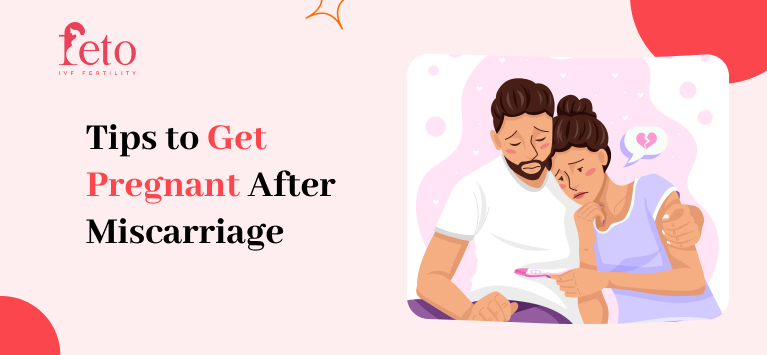
Tips to Get Pregnant After Miscarriage
Key Facts
- 1 in 4 pregnancies ends in miscarriage
- 85% of women who experience one miscarriage go on to have a healthy pregnancy the next time
- Ovulation can return within 2–4 weeks post-miscarriage
- Taking prenatal vitamins before conception boosts chances
- Emotional support improves outcomes
Experiencing a miscarriage can be heartbreaking. Whether it’s your first or you’ve faced it before, the emotional and physical impact can be overwhelming. Here’s the reassuring part: most women have a healthy pregnancy after experiencing a miscarriage.
If you’re thinking about trying again, we will guide you with realistic, medically backed, and emotionally supportive tips to help you get pregnant after a miscarriage.
Can You Get Pregnant After a Miscarriage?
Yes, absolutely. Many women are able to conceive naturally not long after a miscarriage. According to research, over 85% of women who experience a miscarriage go on to have a successful pregnancy later.
Unless your doctor has identified a medical concern, a single miscarriage usually doesn’t impact your overall fertility. It’s natural to worry, but your body is often more resilient than you think.
When Is It Safe to Try Again?
You can technically get pregnant as early as 2–4 weeks after a miscarriage, once ovulation returns. However, most doctors recommend waiting until:
- You’ve had at least one normal menstrual cycle
- Your body has physically recovered
- You feel emotionally ready
The World Health Organization (WHO) suggests waiting 6 months, while many doctors (like those from ACOG) support trying after 1 or 2 cycles if you’re healthy.
Ultimately, follow your doctor’s recommendation, especially if the miscarriage involves complications.
9 Tips to Get Pregnant After Miscarriage
Here’s what you can actually do to improve your chances of a healthy conception.
Get a Full Medical Evaluation
If you’ve had more than one miscarriage or your doctor suspects an underlying issue, consider:
- Hormone testing (thyroid, progesterone, insulin)
- Uterine scans (to detect fibroids, polyps)
- Blood clotting tests
- Genetic testing (karyotyping) for both partners
A clear diagnosis (if any) helps plan the next pregnancy safely.
Track Your Ovulation Accurately
Understanding your fertile window boosts your chance of conception. You can use:
- Ovulation Predictor Kits (OPKs)
- Basal Body Temperature (BBT) charting
- Fertility apps to monitor cycles
Ovulation typically happens about 14 days before your next menstrual period. Following a miscarriage, it can take a few weeks for your menstrual cycle to return to normal.
Maintain a Healthy Weight
Both underweight and overweight conditions can affect ovulation and hormone levels. Aim for a BMI between 18.5–24.9.
Choose fertility-friendly foods like:
- Leafy greens
- Whole grains
- Healthy fats (avocados, nuts)
- Lean proteins
- Iron and folate-rich foods
Balance Hormones Naturally
Hormonal imbalance can disrupt conception. After a miscarriage, make sure:
- Your thyroid levels are within range
- You eliminate possibilities such as PCOS or insulin resistance.
Supplements that may support hormonal health:
- Folic acid (400–800 mcg daily)
- Vitamin D
- Omega-3 fatty acids
- CoQ10 for egg quality
Make sure to consult your doctor before beginning any supplements.
Reduce Stress and Support Mental Health
Emotional healing is equally important as recovering physically.
- Practice mindfulness, yoga, or deep breathing
- Speak with a therapist or support group
- Be kind to yourself, grief looks different for everyone
- Chronic stress may affect hormone regulation and ovulation.
Avoid Alcohol, Smoking & Excess Caffeine
These can lower fertility and increase miscarriage risk.
- Limit caffeine to under 200 mg/day (1 cup of coffee)
- Avoid smoking and alcohol completely when trying to conceive
Have Regular, Timed Intercourse
Doctors recommend having sex every 2–3 days throughout your cycle and especially during your fertile window (the 5 days before ovulation and the day of ovulation).
Don’t worry too much about perfect timing, what truly matters is consistency and emotional connection.
Start Taking Prenatal Vitamins Early
Don’t wait until you’re pregnant. Start your prenatal vitamins at least 1–3 months before trying to conceive. Important ones include:
- Folic Acid (prevents neural tube defects)
- Iron (especially if you had bleeding)
- B12, Zinc, and Iodine
Seek Expert Help if Needed
Consult a fertility specialist if:
- If you’re over 35 and haven’t conceived after 6 months of trying
- You’ve had two or more miscarriages
- You have known conditions like endometriosis, PCOS, or thyroid issues
Fertility doctors can suggest treatments like IUI, IVF, or hormone therapy if needed.
When to See a Fertility Specialist?
Here are some red flags that signal the need for expert intervention:
- Repeated miscarriages
- Irregular periods or no periods after recovery
- Severe cramps or abnormal bleeding
- Difficulty tracking ovulation
A fertility expert can create a customized plan based on your history, age, and test results.
Emotional Healing After Miscarriage
Pregnancy loss isn’t just physical; it’s emotional. Take time to:
- Acknowledge the grief
- Speak to a therapist or support group
- Avoid self-blame
Remember, trying again doesn’t mean forgetting. You’re honoring your journey by moving forward with hope.
Common Myths About Conceiving After Miscarriage
Myth 1: You’re less fertile after miscarriage
Truth: Many women are equally or even more fertile in the months following a miscarriage.
Myth 2: You must wait 6 months to try again
Truth: Medical experts now agree you can try after 1–2 normal periods unless advised otherwise.
Myth 3: Miscarriage means future pregnancy loss
Truth: Most miscarriages are isolated events, not repeated patterns.
Conclusion
Trying to conceive after a miscarriage often comes with a whirlwind of emotions; hope, fear, anxiety, and excitement all rolled into one. The truth is, most women do go on to have a healthy pregnancy.
Focus on your physical recovery, emotional healing, and fertility basics like ovulation tracking and lifestyle adjustments. If things don’t go as planned, know that help is available.
You are not alone and your next chapter could be the one you’ve been waiting for.
Frequently Asked Question
Is it harder to get pregnant after a miscarriage?
Not typically. Fertility usually remains normal after a single miscarriage.
How soon can I ovulate after miscarriage?
Ovulation can happen within 2–4 weeks, depending on your cycle and recovery.
Do I need fertility treatment after one miscarriage?
Not unless it recurs. Many go on to conceive naturally.
Can stress cause another miscarriage?
While stress alone won’t cause miscarriage, chronic stress can disrupt hormones.
Should I change my lifestyle before trying again?
Yes—eat well, reduce stress, avoid alcohol/smoking, and take prenatal vitamins.
